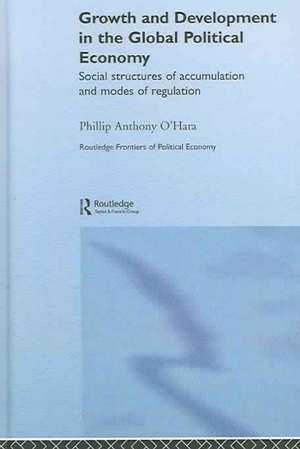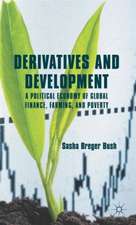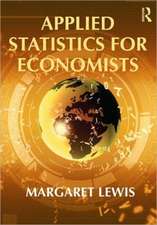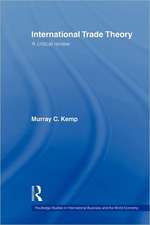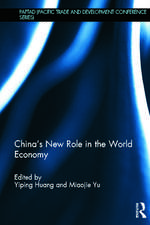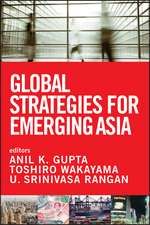Growth and Development in the Global Political Economy: Modes of Regulation and Social Structures of Accumulation: Routledge Frontiers of Political Economy
Autor Phillip O'Haraen Limba Engleză Hardback – 8 dec 2005
This book studies the impact of neoliberal globalization on growth and development in the world economy. It scrutinizes whether new social structures of accumulation or modes of regulation have emerged to promote long-term socioeconomic performance in the global economy during the early years of the twenty-first century. Special reference is given to the specific performance of neoliberal governance; transnational corporations; global institutions of money, trade and production; international relations of war and terrorism; financial institutions; and the family-community environment.
It is a comprehensive analysis of the degree to which institutional development has managed to promote socioeconomic performance in the global economy. It also presents a thorough policy program of action for long wave upswing in the world economy. It will be especially useful for those scholars and students concerned with issues of governance, global political economy, institutions and macroeconomics
| Toate formatele și edițiile | Preț | Express |
|---|---|---|
| Paperback (1) | 327.21 lei 6-8 săpt. | |
| Taylor & Francis – 13 oct 2009 | 327.21 lei 6-8 săpt. | |
| Hardback (1) | 705.64 lei 6-8 săpt. | |
| Taylor & Francis – 8 dec 2005 | 705.64 lei 6-8 săpt. |
Din seria Routledge Frontiers of Political Economy
-
 Preț: 309.90 lei
Preț: 309.90 lei -
 Preț: 309.79 lei
Preț: 309.79 lei -
 Preț: 316.03 lei
Preț: 316.03 lei -
 Preț: 310.55 lei
Preț: 310.55 lei - 9%
 Preț: 867.54 lei
Preț: 867.54 lei -
 Preț: 309.04 lei
Preț: 309.04 lei -
 Preț: 311.61 lei
Preț: 311.61 lei -
 Preț: 286.98 lei
Preț: 286.98 lei -
 Preț: 327.83 lei
Preț: 327.83 lei - 9%
 Preț: 1005.48 lei
Preț: 1005.48 lei -
 Preț: 386.11 lei
Preț: 386.11 lei - 9%
 Preț: 938.47 lei
Preț: 938.47 lei -
 Preț: 302.75 lei
Preț: 302.75 lei -
 Preț: 151.96 lei
Preț: 151.96 lei -
 Preț: 318.54 lei
Preț: 318.54 lei -
 Preț: 317.95 lei
Preț: 317.95 lei -
 Preț: 310.01 lei
Preț: 310.01 lei -
 Preț: 326.49 lei
Preț: 326.49 lei -
 Preț: 155.43 lei
Preț: 155.43 lei -
 Preț: 309.79 lei
Preț: 309.79 lei -
 Preț: 152.66 lei
Preț: 152.66 lei -
 Preț: 328.76 lei
Preț: 328.76 lei -
 Preț: 281.72 lei
Preț: 281.72 lei -
 Preț: 286.58 lei
Preț: 286.58 lei -
 Preț: 325.09 lei
Preț: 325.09 lei -
 Preț: 356.63 lei
Preț: 356.63 lei -
 Preț: 371.95 lei
Preț: 371.95 lei -
 Preț: 310.95 lei
Preț: 310.95 lei -
 Preț: 324.87 lei
Preț: 324.87 lei -
 Preț: 312.86 lei
Preț: 312.86 lei -
 Preț: 374.16 lei
Preț: 374.16 lei -
 Preț: 329.09 lei
Preț: 329.09 lei -
 Preț: 340.61 lei
Preț: 340.61 lei - 26%
 Preț: 1047.06 lei
Preț: 1047.06 lei - 18%
 Preț: 1169.45 lei
Preț: 1169.45 lei - 18%
 Preț: 1555.17 lei
Preț: 1555.17 lei - 18%
 Preț: 1053.92 lei
Preț: 1053.92 lei - 18%
 Preț: 1059.84 lei
Preț: 1059.84 lei - 31%
 Preț: 767.47 lei
Preț: 767.47 lei - 18%
 Preț: 731.92 lei
Preț: 731.92 lei - 26%
 Preț: 822.54 lei
Preț: 822.54 lei - 18%
 Preț: 1796.21 lei
Preț: 1796.21 lei - 26%
 Preț: 1184.91 lei
Preț: 1184.91 lei - 18%
 Preț: 1120.23 lei
Preț: 1120.23 lei - 15%
 Preț: 700.95 lei
Preț: 700.95 lei - 18%
 Preț: 1116.31 lei
Preț: 1116.31 lei - 22%
 Preț: 299.52 lei
Preț: 299.52 lei - 18%
 Preț: 999.46 lei
Preț: 999.46 lei
Preț: 705.64 lei
Preț vechi: 830.16 lei
-15% Nou
Puncte Express: 1058
Preț estimativ în valută:
135.03€ • 141.33$ • 112.38£
135.03€ • 141.33$ • 112.38£
Carte tipărită la comandă
Livrare economică 31 martie-14 aprilie
Preluare comenzi: 021 569.72.76
Specificații
ISBN-13: 9780415296526
ISBN-10: 0415296528
Pagini: 272
Ilustrații: 39 tables and 23 line drawings
Dimensiuni: 156 x 234 x 20 mm
Greutate: 0.66 kg
Ediția:1
Editura: Taylor & Francis
Colecția Routledge
Seria Routledge Frontiers of Political Economy
Locul publicării:Oxford, United Kingdom
ISBN-10: 0415296528
Pagini: 272
Ilustrații: 39 tables and 23 line drawings
Dimensiuni: 156 x 234 x 20 mm
Greutate: 0.66 kg
Ediția:1
Editura: Taylor & Francis
Colecția Routledge
Seria Routledge Frontiers of Political Economy
Locul publicării:Oxford, United Kingdom
Public țintă
Postgraduate and ProfessionalCuprins
Figures Tables Forward Preface Acknowledgements 1. Long Waves of Growth & Development in the Global Political Economy 2. Cultural Contradictions of Global Capitalism 3. A Global Neoliberal Social Structure of Accumulation? 4. A Transnational Corporate Social Structure of Accumulation? 5. A Global Money-Trade-Production Mode of Regulation? 6. A Global Unipolar, ‘Anti-Terrorist’ Social Structure of Accumulation? 7. A Regime of Accumulation for Sustainable Productivity and Demand? 8. A Financial Social Structure of Accumulation? 9. A Family-Community Social Structure of Accumulation? 10. Post-Neoliberal Governance for Sustainable Global Growth and Development Index
Notă biografică
Phillip Anthony O’Hara is Professor of Global Political Economy and Governance and Director of the Global Political Economy Research Unit, at Curtin University, Perth, Australia. He won the European Association for Evolutionary Political Economy ‘2002 Gunnar Myrdal Prize’ for Marx, Veblen and Contemporary Institutional Political Economy (Elgar 2000); is the editor of Global Political Economy and the Wealth of Nations (Routledge, 2004) as well as the Encyclopedia of Political Economy (2001, Routledge, paper edition). He is the author of over 60 articles in scholarly journals and edited books, such as the Review of International Political Economy, Review of Radical Political Economics, Journal of Economic Issues, Review of Social Economy, and European Journal of the History of Economic Thought.
Descriere
This intriguing book uses a 'social structures of accumulation' approach to address the big questions in political economy, and will be of interest to historians, political economists and macroeconomists.
